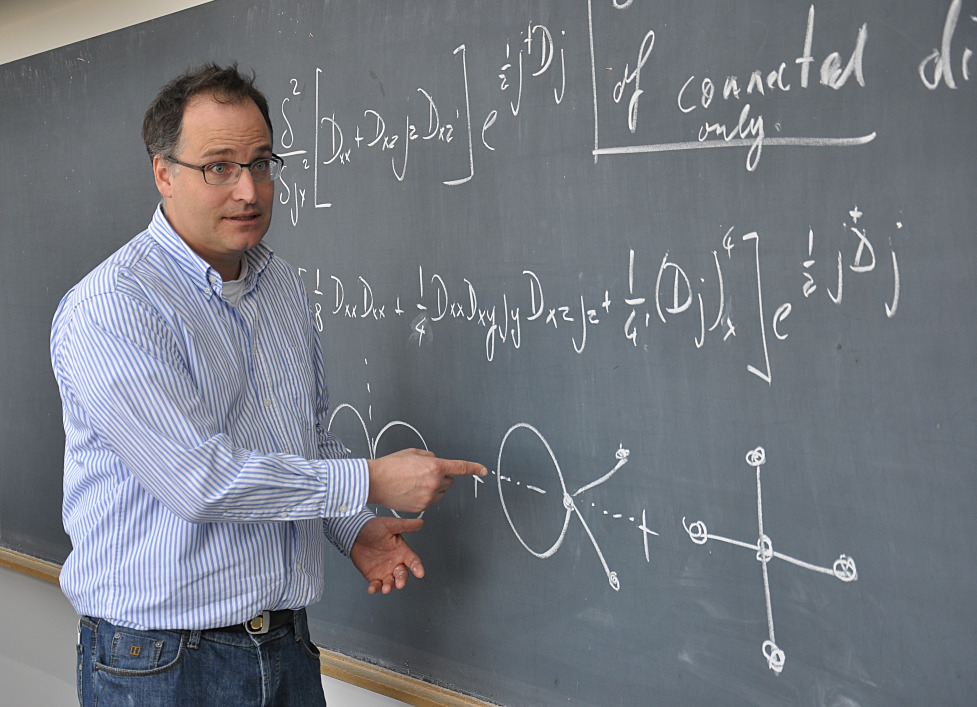
2025 Lecture on Intelligence & Field Theory
Intelligent systems, biological or artificial, have internal representations of their environment and use this knowledge to guide their actions. How do they obtain, represent, update, and exploit this knowledge? What are the underlying principles? Can we formulate a theory of intelligent systems? Can we use it for doing computational psychology? This lecture addresses such questions from a mathematical perspective. It discusses the role of generative models in the architecture of minds. It shows how these can be used for perception, the process of turning sensory data into images of the world, and for planning, the preparation of actions. For the mathematical understanding the formalism of information field theory (IFT) will be introduced, following (partly) the materials from the lecture on IFT in the years before (see below). The lecture closes with an exam that yields 9 ETCS if performed successfully.
Exercises There will be two lectures per week
begin: 28.04.2024, end: 22.07.2023
- Monday, 14:00 - 16:00, Schellingstr. 4, H 030
- Tuesday, 12:00 - 14:00, Geschw.-Scholl-Pl. 1 (N) / Kleiner Physiksaal (N 020)
Examination:
Tuesday, either July 22th or July 28th, 12:00 - 14:00
2024 Lecture on Information Field Theory
Script Recordings Handouts ExaminationsInferring fields (functions over continuous spaces) from finite data is a problem central to signal reconstruction, dynamical systems, and artificial intelligence. Information field theory (IFT) addresses this from a probabilistic perspective by exploiting concepts of statistical physics, field theory, and machine learning. The lecture introduces the key concepts of IFT, its mathematical formalism, its computational methods, its relation to neural field theory and to neural network models, and covers advanced topics like inferring dynamical fields and their dynamical laws empirically. The lecture aims at master students that are theoretically oriented, that want to solve concrete signal reconstruction problems, or that are interested in concepts underlying artificial neural network techniques. It closes with an exam that yields 9 ETCS if performed successfully.
The following topics are planned to be addressed:
- Information measure and information geometry
- Gaussian processes and neural field theory
- Fourier space field representation
- Linear and non-linear filter theory
- Feynman diagrams and re-summation techniques in IFT
- Generative models with fields and generative neural networks
- Variational inference based on information geometry
- Dynamical field inference and supersymmetry therein
The course will be a in person blackboard lecture. Recordings of previous courses on IFT can be found here. Please note that the lecture will deviate from those by aiming for more advanced topics.
2024 Tutorials for Information Field Theory
There are two tutorials per week: Begin: 15.04.2022, End: 19.07.2022
- group A, Wednesday 18:00 - 20:00, Theresienstr. 37 / A 449 ,
- group B, Thursday, 10:00 - 12:00, Theresienstr. 37 / A 249 ,
Bonus System
Exercises are optional, but can be used to get bonus points for the exam. The bonus will be 15% of the points which are necessary to achieve a 1.0 in the exam. It will be ensured that top marks are well reachable without the bonus. The bonus system is structured as following:
- Each week we will hand out work sheets with approximately three problems. Points are assigned to each task and subtask.
- In a list handed out at the beginning of each tutorial students are asked to denote which which problems they are potentially able to present.
- In order to get the full bonus for the respective exam (IT or IFT), students need to sign up for at least 60% of all possible achievable points during each part
- The tutors choose students randomly from the list mentioned earlier.
- In case the student is not able to properly solve the task, they might lose up to twice the points they could have gained through the correct solution.
- EXTRA: If the student wants to
present voluntarily and do a exceptionally clear and
instructive presentation you might get double as many points.
If the presentation is not very clear, they get only the regular amount of points.
(Talk to the tutor before the beginning of the tutorial)
Signal reconstruction with Python, EDV-Zusatzausbildung (SQ1+SQ2, September 23-27, 2024)
One week block-course with exercises and presentation. Signal reconstruction from data will be trained via small programming projects of the students' own choices, followed by presentations of the achievements and experiences.
Required are a basic knowledge of Python and a laptop with installations of Python3 as well as the used Python packages "numerical python" (NumPy), "scientific python" (SciPy), and "numerical information field theory" (NIFTy) in their latest announced versions. The number of participants is limited.
The Key Qualification certificate is obtained by a presentation of the student's achievement at the end of the
course.
Date: September 23-27th 2024, 9:00-16:00
Location: MPI for Astrophysics, Garching
Registration: July 26 until July 21st
Please register in the LSF system of the LMU until July 24th. The number of participants is limited.
Seminar on Artificial Intelligence, Bayes, & Cognition (October 2023)
In the seminar, concepts of artificial intelligence and cognition will be discussed from a Bayesian probabilistic perspective, as for example taught in the lecture on Information Theory.
Possible topics
for talks are the theory of neural networks, generative networks (following adversarial, auto-encoder, or information field theory designs), signal perception systems (receptor/measurement principles, information processing, signal extraction & reconstruction),
knowledge representation (coding theory, neural networks, data compression), artificial & biological cognition (approaches, models, designs),
interacting intelligent systems (game theory, computational economics, sociology, & psychology),
quantum intelligence (quantum computing, quantum machine learning), and more (participants’ ideas).
The connecting element of these topics, Bayesian reasoning and information theory, should made be visible in the presentations, whenever possible. Highlighting the physics perspective (application in physics, related physical concepts, physical implementations) is encouraged, wherever appropriate.
Date: 9.10.2023 - 11.10.2023
Location: MPI for Astrophysics
Recommended prerequisite: Information (field) theory
Registration: Please register in the LSF system of the LMU between July 25th and August 14th. The number of participants is limited.